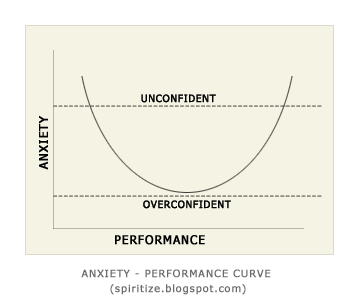Notes to Self
Thoughts on psychology, spirituality and soft skill development for personal improvement
Updated Notes
Latest Notes
Confidence
Confident: (noun) Freedom from doubt; belief in yourself and your abilities.
The dictionary has only got it half right. Confidence (or self confidence) is about belief in yourself and your abilities, but not the absence of doubt.
How does "doubts" contribute to the confidence level of a person? It creates anxiety - which sets of a physiological reaction in the body. But like everything else in life, an appropriate level of balance is required. The graph below shows how performance increases (up to a point) when anxiety decreases and vice-versa.

The most important thing depicted (and to be remembered) is how performance reaches a certain point, and stays there until there is a change in your current "comfort level". If you want to increase your performance you will have to experience some physical and / or emotional discomfort - often in the form of anxiety due to self-doubts and uncertainties - will I be able to get better grades? What if I fail? What if they make fun of me once they know that I am trying to lose weight? ... and so on.
The states of confidence could thus be described as:
- Overconfident: In the absence of anxiety a person could become reckless due to overconfidence. This state can be identified by the cognitive thought process of everything appearing rosy. An overconfident person doesn't see the need to consider all possible outcome and is sure the outcome will be what he / she has perceived.
- Unconfident: An unconfident person on the other hand gets paralyzed due to anxiety. The person tends to have lots of self-doubts, becomes very critical about himself / herself and have low opinion of self (low self esteem). This causes a vicious cycle where the anxiety cripples the person into inaction, and he / she continues to berate herself thus creating more anxiety.
- Confident: When the anxiety is at an optimum level, you are at your best. You know that negative outcomes are possible, but rather than exaggerating or minimizing it, you give it the due attention necessary (what can I do if this happens ...).
So perhaps a better definition of confidence is the state of balanced perceptions and preparation.
Related » Learn the difference between self-esteem and self-confidence
Old Notes
- ¤ December 2005
- ¤ January 2006
- ¤ February 2006
- ¤ April 2006
- ¤ June 2006
- ¤ July 2006
- ¤ September 2006
- ¤ October 2006
- ¤ November 2006
- ¤ December 2006
- ¤ January 2007
- ¤ May 2007
- ¤ August 2007
- ¤ October 2007
- ¤ March 2008
- ¤ April 2008
- ¤ June 2008
- ¤ October 2008
- ¤ December 2008
- ¤ January 2009
- ¤ March 2009
- ¤ June 2009
- ¤ June 2012
- ¤ December 2013